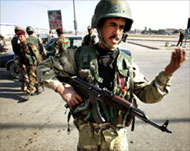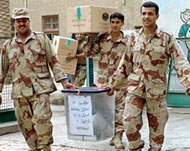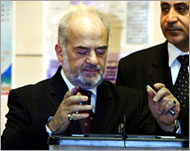Iraq turnout estimated at two-thirds
More than two-thirds of Iraqi voters turned out in the country’s landmark election, according to first estimates on Friday.

Millions of votes were being counted after Thursday’s election for the first full-term government since Saddam Hussein was ousted from the presidency in 2003. There was little violence, unlike a vote in January.
Farid Ayar, a senior electoral official, said: “The number of whose who took part in the ballot should be between 10 and 11 million voters, according to our first estimates.”
A figure of 11 million voters would put turnout at around 70%.
However, final results however are not expected for at least two weeks and the country faces much political horse-trading before a new government is installed.
Kamran Qaradaghi, spokesman for Jalal Talabani, the Iraqi president, said: “Iraqis are ready to determine their future by democratic means through the ballot box.”
Strong turnout
Shia parties scored well in their strongholds in the south of the country, while Sunni regions also reported strong turnout.
Global leaders hailed the vote, which many hope will end the violence raging since Saddam’s downfall in April 2003 and pave the way for an exit of US-led foreign troops.
George W Bush, the US president, said: “This is a major step forward in achieving our objective, which is having a democratic Iraq, a country able to sustain itself and defend itself.”
 |
|
Security was tight and voting day |
The US-led 2003 invasion and its aftermath has killed around 2155 US soldiers, causing Bush’s poll ratings to plunge. He admitted on Wednesday that the war had been based on faulty intelligence.
Newspapers across the Arab world also hailed Sunni Arab participation as a “turning point” that should grant legitimacy to the new government.
The Saudi English-language daily, Arab News, said: “It was the voice of the Iraqi people that was being heard yesterday, not the bomb blasts of the terrorists.”
With a massive security operation in force nationwide to guard against attacks, the number of voters appeared to have surpassed turnout in the October referendum and the January elections.
Observers’ verdict
Kofi Annan, the UN secretary-general, said: “I would hope that once the results are announced … everyone will accept the results.”
An international monitoring mission said the election had “generally” met international standards despite some procedural issues, and hailed the organisers for meeting a “difficult challenge”.
 |
|
A huge security operation was |
A growing force was Iyad Allawi, the former interim prime minister who headed a non-sectarian coalition that reached out to Sunnis and also attracted the votes of secular Shia in urban areas.
Ibrahim al-Jaafari, the current prime minister, said that if his United Iraqi Alliance (UIA) wins the election, it will carve out a role for supporters of Shia cleric Moqtada al-Sadr.
“There is nothing that risks them substituting the pen for the gun,” al-Jaafari told BBC television.
The UIA was dominant in five southern Shia provinces, according to non-official results obtained by AFP from electoral and party sources.
Hot-spot figures
In the western Anbar region, where most anti-government groups are based, officials estimated turnout of 85-95% in Falluja, a former centre of anti-US activity – where some polling stations even ran out of ballot papers.
 |
|
Leaders cast their votes in |
The electoral commission also estimated that turnout for the hot-spot of Ramadi was 75-80%.
A total of 15.5 million Iraqis were called to vote for a four-year 275-member parliament – choosing from 7655 candidates and 307 political entities, nearly triple the number in January.
Iraqis, the elderly and infirm included, walked to polling stations because of a vehicle ban, one of a series of security measures including a weapons ban, border closures and an extended curfew.
But even with Iraq’s entire army and police force mobilised, four people died in attacks.
An al-Qaida linked group had vowed to disrupt the poll and loud blasts periodically rocked Baghdad throughout the day.